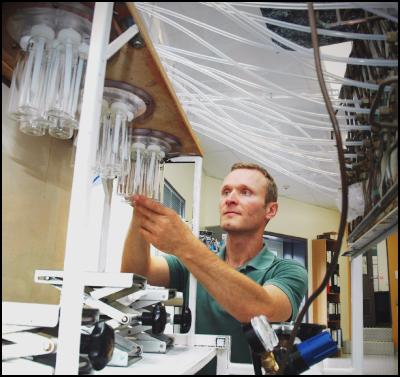Lower Hutt Lab Comes Out Top Of The World
Lower Hutt Lab Comes Out Top Of The World

Scientist Uwe Morgenstern prepares equipment to determine the age of a batch of water samples. The laboratory he manages produces the most accurate water dating measurements in the world.
Our national sporting teams may have had a patchy year, but New Zealand scientists have done their bit to put the country on the international map.
A water dating laboratory operated by GNS Science has come out top in an accuracy test in which 70 water dating laboratories around the world participated.
The GNS Science Tritium and Water Dating Laboratory has shown itself to be four times more accurate than the second-placed laboratory in the international comparison. The inter-laboratory comparison has been run every four or five years by the International Atomic Energy Agency since 1965. Results from the most recent comparison have just been released.
Tritium is a rare isotope of hydrogen that occurs naturally in rainwater and snow. With a half-life of 12.3 years, it can be used to find out when water fell to earth as either rain or snow.
Tritium dating is a valuable tool in understanding the dynamics of groundwater, glaciers, and lakes. Knowing the age of groundwater helps in managing aquifers effectively. Water age also indicates if groundwater is free of pathogens and therefore safe for drinking. Another area where water dating is important is in understanding and managing nitrification of lakes such as Rotorua and Taupo.
Age-dating by the tritium method is based on measuring the portion of tritium that has decayed to helium-3, another rare isotope that occurs in water. Tritium concentrations start to decrease as soon as rain penetrates the ground.
Each of the 70 participating laboratories was asked to measure tritium concentrations in six blind water samples. The GNS Science Laboratory was the only lab to get all six samples right.
Manager of the GNS Science Laboratory, Uwe Morgenstern, said the result was very gratifying and would help in securing more business, especially from overseas.
“ We can now say unequivocally that we are the most accurate tritium dating lab in the world. That will help considerably in attracting new business, especially from Europe and North America,” Dr Morgenstern said. About 70 percent of the Laboratory’s business currently comes from overseas.
The Laboratory’s measurements have been adopted by New Zealand government policy-makers as a benchmark for the security of drinking water from aquifers. New Zealand is believed to be the only country in the world where tritium measurements are included in government environmental policy.
ENDS


 Financial Markets Authority: FMA Seeks Clarity From High Court On Use Of Eligible Investor Certificates In Wholesale Investment Sector
Financial Markets Authority: FMA Seeks Clarity From High Court On Use Of Eligible Investor Certificates In Wholesale Investment Sector Scion: Scion’s Novel Internship Model Connects Talent With Industry
Scion: Scion’s Novel Internship Model Connects Talent With Industry Financial Markets Authority: Westpac Admits To Misleading Representations That Resulted In $6.35m In Overcharges
Financial Markets Authority: Westpac Admits To Misleading Representations That Resulted In $6.35m In Overcharges Bill Bennett: Download Weekly - Review Of 2024
Bill Bennett: Download Weekly - Review Of 2024 Bill Bennett: One NZ scores worldwide first as Starlink direct-to-mobile launches
Bill Bennett: One NZ scores worldwide first as Starlink direct-to-mobile launches Hugh Grant: How To Reduce Network Bottlenecks
Hugh Grant: How To Reduce Network Bottlenecks



